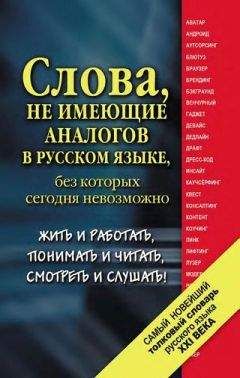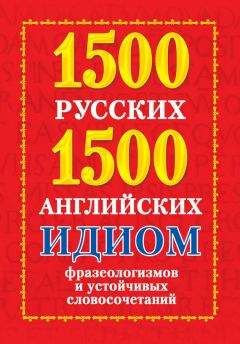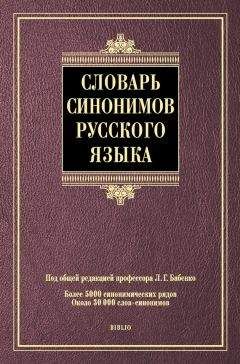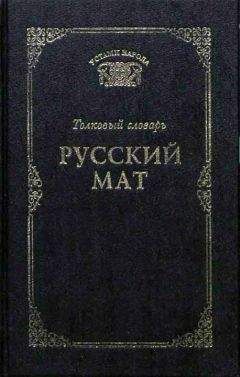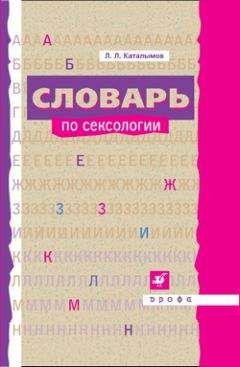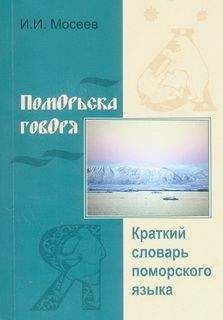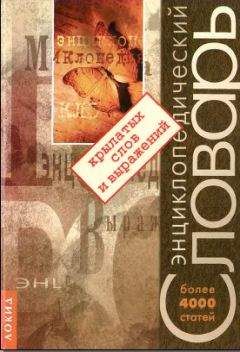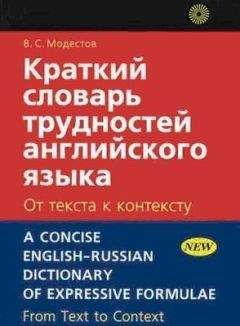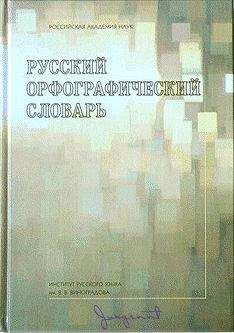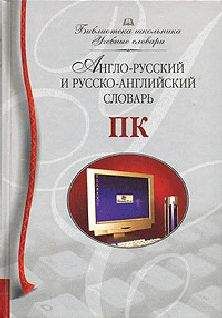Adam Makkai - Словарь американских идиом: 8000 единиц
Скачивание начинается... Если скачивание не началось автоматически, пожалуйста нажмите на эту ссылку.
Жалоба
Напишите нам, и мы в срочном порядке примем меры.
Описание книги "Словарь американских идиом: 8000 единиц"
Описание и краткое содержание "Словарь американских идиом: 8000 единиц" читать бесплатно онлайн.
Это обновленное и дополненное издание, содержащее более 8000 идиоматических слов и выражений, причем каждое из которых снабжено грамматическим объяснением и практическим примером. Словарь содержит лексемные идиомы, фразеологические единицы и поговорки, имеющие особенное значение. В нем приведены наиболее употребительные выражения только американского английского языка. Этот словарь — идеальное пособие для студентов, часто разъезжающих бизнесменов и просто путешественников.
[wear well]{v.} 1. To continue to be satisfactory, useful, or liked for a long time. •/My old overcoat has worn very well./ •/Their marriage has worn well./ •/That author wears well./ Compare: STAND UP(2). 2. To carry, accept, or treat properly or well. •/Grandfather wears his years well./ •/Tommy has won many honors but he wears them well./
[weasel out]{v. phr.} To renege on a previous promise; not keep an obligation for some not always straight reason. •/I’m so tired I think I am going to weasel my way out of going to that meeting this afternoon./
[weasel word]{n.}, {informal} A word which has more than one meaning and may be used to deceive others. •/When the thief was being questioned by the police, he tried to fool them with weasel words./
[weather] See: FAIR-WEATHER FRIEND.
[weather eye]{n.} 1. Eyes that can tell what the weather will be. •/Grandfather’s weather eye always tells him when it will rain./ 2. Eyes ready or quick to see; careful watch. — Usually used in phrases like "keep a weather eye on", "open", or "out for". •/Mrs. Brown kept a weather eye on the children so they wouldn’t hurt each other./ •/Keep a weather eye out for Uncle George at the store./ •/Keep a weather eye open for deer./ •/The police have a weather eye out for the robbers./ Compare: LOOK OUT.
[weather the storm]{v. phr.} To survive some disaster. •/When Peter and Sue started their business they had very little money, but in a year they weathered the storm./
[wedge] See: FLYING WEDGE.
[wedlock] See: BORN OUT OF WEDLOCK.
[wee hours] The crack of dawn, or just before it, usually between 1 A.M. and 4 A.M. or 2 A.M. and 5 A.M. •/He stayed up all night when they were expecting their first child; finally, a boy was born in the wee hours of the morning./ Compare: SMALL HOURS.
[weeper] See: FINDERS KEEPERS or FINDERS KEEPERS LOSERS WEEPERS.
[weed out]{v.} 1. To remove what is unwanted, harmful, or not good enough from. •/Mother weeded out the library because there were too many books./ •/Many colleges and universities weed out their freshman classes to make room for better students./ 2. To take (what is not wanted) from a collection or group; remove (a part) for the purpose of improving a collection or group; get rid of. •/The coach is weeding out the weak players this week./ •/The teacher told Elizabeth to read over her English composition and weed out every sentence that was not about the subject./
[wee folk] or [little folk] or [little people] {n. phr.} Fairy people; brownies; elves; fairies; or goblins. •/Mother read me a story about the wee folk who lived in the forest and came out at night./ •/There are many stories about little people dancing in the moonlight./
[week in, week out] See: DAY IN, AND DAY OUT.
[week of Sundays]{n. phr.} A long time; seven weeks. •/I haven’t seen them in a week of Sundays./
[weigh anchor]{v. phr.} To set sail; get going. •/After a week in Hawaii, we weighed anchor and sailed south toward Tahiti./
[weigh down] also [weight down] 1. To make heavy; cause to go down or bend with weight; overload. •/The evergreens are weighed down by the deep snow./ — Often used with "with" or "by". •/There are so many children in the back seat that they are weighing down the back of the car./ 2a. To overload with care or worry; make sad or low in spirits. — Usually used in the passive. •/The family is weighed down by sorrow./ •/The company is weighed down by debt./ 2b. To make heavy, hard, or slow; make dull or uninteresting. — Often in the passive used with "by" or "with". •/The book is weighted down with footnotes./ •/The TV program is weighed down by commercials./
[weigh in]{v.} 1a. To take the weight of; weigh. •/The man at the airport counter weighed in our bags and took our plane tickets./ •/A doctor weighed in the wrestlers./ 1b. To have yourself or something that you own weighed. — Often used with "at". •/I weighed in at 100 pounds on the scale today./ •/We took our bags to the airport counter to weigh in./ 1c. To have yourself weighed as a boxer or wrestler by a doctor before a match. — Often used with "at". •/The champion didn’t want to weigh in at more than 160 pounds./ 2. {slang} To join or interfere in a fight, argument, or discussion. •/We told Jack that if we wanted him to weigh in with his opinion we would ask him./ Compare: TAKE PART.
[weigh on] or [weigh upon] {v.} 1. To be a weight or pressure on; be heavy on. •/The pack weighed heavily on the soldier’s back./ 2. To make sad or worried; trouble; disturb; upset. •/Sadness weighed on Mary’s heart when her kitten died./ •/John’s wrongdoing weighed upon his conscience./ •/The teacher’s advice weighed upon Tom’s mind./ 3. To be a burden to. •/His guilt weighed heavily upon him./
[weigh on one’s mind] See: WEIGH ON(2).
[weigh one’s words]{v. phr.} To choose your words carefully; be careful to use the right words. •/When a teacher explains about religion, he must weigh his words because his pupils may be of several different faiths./ •/When old Mr. Jones talked to the students about becoming teachers, he spoke slowly, weighing his words./ •/In a debate, a political candidate has little time to weigh his words, and may say something foolish./
[weight] See: PULL ONE’S WEIGHT, SWING ONE’S WEIGHT, THROW ONE’S WEIGHT AROUND.
[weight down] See: WEIGH DOWN.
[weight of the world on one’s shoulders] or [world on one’s shoulders] or [world on one’s back] {n. phr.} A very heavy load of worry or responsibility; very tired or worried behavior, as if carrying the world; behavior as if you are very important. •/Don’t look as if you had the weight of the world on your shoulders, Henry, just because you have to mow the lawn./ •/John acts as if he were carrying the world on his back because he has a paper route./
[weigh upon] See: WEIGH ON.
[welcome] See: WEAR OUT ONE’S WELCOME.
[welcome mat]{n.} 1. A mat for wiping your shoes on, often with the word "welcome" on it, that is placed in front of a door. •/Mother bought a welcome mat for our new house./ 2. {informal} A warm welcome; a friendly greeting. — Used in such phrases as "the welcome mat is out" and "put out the welcome mat". •/Our welcome mat is always out to our friends./ •/Spread out the welcome mat, children, because Uncle Bill is visiting us tonight./ Syn.: LATCH STRING(2). Compare: ROLL OUT THE RED CARPET, WITH OPEN ARMS.
[welcome with open arms] See: WITH OPEN ARMS.
[well] See: ALL VERY WELL, AS WELL, AS WELL AS, HAIL FELLOW WELL MET, LET WELL ENOUGH ALONE, PLAY ONE’S CARDS RIGHT or PLAY ONE’S CARDS WELL, VERY WELL, WEAR WELL.
[well and good]{adj. phr.} Good; satisfactory. •/If my daughter finishes high school, I will call that well and good./ — Often used without a verb to show agreement or understanding. •/Well and good; I will come to your house tomorrow./ Compare: ALL RIGHT, ALL VERY WELL, VERY WELL.
[well-heeled]{adj.}, {slang} Wealthy; having plenty of money. •/Bob’s father, who is well-heeled, gave him a sports car./ Compare: IN CLOVER, ON EASY STREET.
[well-off]{adj. phr.} 1. Rich. •/They may not be millionaires, but they are sufficiently well-off./ 2. In good condition; free of problems or difficulties./ •/He is pleased that his business is well-off./
[well put]{adj. phr.} Well expressed or defined. •/His remarks about too much violence on television were extremely well put./
[well-to-do]{adj.} Having or making enough money to live comfortably; prosperous. •/John’s father owns a company and his family is well-to-do./ — Often used with "the" like a plural noun. •/This is the part of town where the well-to-do live./ Compare: IN THE LAP OF LUXURY, IN THE CHIPS, ON EASY STREET.
[wet] See: ALL WET, GET ONE’S FEET WET, MAD AS A WET HEN, WRINGING WET.
[wet behind the ears]{adj. phr.}, {informal} Not experienced; not knowing how to do something; new in a job or place. •/The new student is still wet behind the ears; he has not yet learned the tricks that the boys play on each other./ Compare: DRY BEHIND THE EARS.
[wet blanket]{n.}, {informal} A person or thing that keeps others from enjoying life. •/The teenagers don’t invite Bob to their parties because he is a wet blanket./ •/The weatherman throws a wet blanket on picnic plans when he forecasts rain./ Compare: CREPE HANGER.
[wet one’s whistle]{v. phr.}, {slang} To have a drink, especially of liquor. •/Uncle Willie told John to wait outside for a minute while he went in to the cafe to wet his whistle./
[whack] See: OUT OF WHACK.
[whale away]{v.}, {informal} 1. To beat or hit hard; strike again and again. — Often used with "at". •/The boxer is whaling away at his opponent with both fists./ 2. To attack severely or again and again; go on without stopping or with great force; pound away. •/Mary has been whaling away on the typewriter for an hour./ — Often used with "at". •/During the election the Mayor whaled away at the other party in his speeches./
[whale the --- out of] See: BEAT THE --- OUT OF.
[what] See: COME WHAT MAY, GET WHAT’S COMING TO ONE, I’LL TELL YOU WHAT, JUST WHAT THE DOCTOR ORDERED, SO WHAT.
[what about]{interrog.} 1. About or concerning what; in connection with what. — Often used alone as a question. •/"I want to talk to you." "What about?"/ Compare: WHAT FOR. 2. See: WHAT OF IT. 3. See: HOW ABOUT.
[what about that] See: HOW ABOUT THAT.
[What a pity!] How unfortunate! What a shame! •/What a pity that he couldn’t join us on our Hawaiian trip./
[what for(1)]{interrog.} For what reason; why? •/I told Mary what I was going to town for./ •/What are you running for?/ — Often used alone as a question. •/Billy’s mother told him to wear his hat. "What for?" he asked./ Compare: HOW COME.
[what for(2)]{n. phr.}, {informal} A scolding, or other punishment. — Usually used with "get" or "give". •/Tom got what for from his father for answering him rudely, and I heard him crying in the house./ •/The teacher gave me what for because I was late./
[what have you] or [what not] {n. phr.}, {informal} Whatever you like or want; anything else like that. •/The store sells big ones, small ones, medium ones, or what have you./ •/We found suits, coats, hats and what not in the closet./ Syn.: AND SO FORTH.
[what if] What would, or will, happen if; what is the difference if; suppose that. •/What if you go instead of me?/ •/What if we paint it red. How will it look?/ •/"You can’t go now" said mother. "What if I do?" Dick asked./ •/What if Jack scores a touchdown?/
[what is what] See: WHAT’S WHAT.
[what of it] or [what about it] {interj.}, {informal} What is wrong with it; what do you care. •/Martha said "That boy is wearing a green coat." Jan answered, "What of it?"/ •/"John missed the bus." "What of it?"/ Syn.: SO WHAT.
[what not] See: WHAT HAVE YOU.
[what’s cooking] See: WHAT’S UP.
[what’s doing] See: WHAT’S UP..
[what’s sauce for the goose, is sauce for the gander] What goes for the one, also goes for the other. — A proverb. •/If Herb gets a speeding ticket, so should Erica, who was right behind him; after all, what’s sauce for the goose is sauce for the gander./
[what’s the big idea] or [what’s the idea] {informal} What is the purpose; what do you have in mind; why did you do that; what are you doing; how dare you. — Often used to question someone or something that is not welcome. •/The Smith family painted their house red, white, and blue. What’s the big idea?/ •/What’s the idea of coming in here after I told you not to?/ •/I heard you are spreading false rumors about me, what’s the big idea?/
Подписывайтесь на наши страницы в социальных сетях.
Будьте в курсе последних книжных новинок, комментируйте, обсуждайте. Мы ждём Вас!
Похожие книги на "Словарь американских идиом: 8000 единиц"
Книги похожие на "Словарь американских идиом: 8000 единиц" читать онлайн или скачать бесплатно полные версии.
Мы рекомендуем Вам зарегистрироваться либо войти на сайт под своим именем.
Отзывы о "Adam Makkai - Словарь американских идиом: 8000 единиц"
Отзывы читателей о книге "Словарь американских идиом: 8000 единиц", комментарии и мнения людей о произведении.





